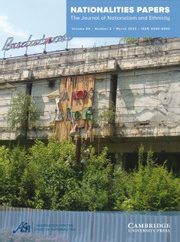The Boundary Work of Albanian Language in the 17th-18th Centuries
“(…) the contradicting motivations of political contradistinction, Enlightenment propagation, Orthodox evangelism, ecclesiastical confrontation, and missionary counteraction lead inadvertently to a boundary work of the social reorganisation of linguistic and cultural difference.” A. Doja
Albert Doja
Ecclesiastical Pressures and Language Politics
The Boundary Work of Albanian Language in the 17th-18th Centuries
After many years of hard work, it is my pleasure to have finally this article in online FirstView.
I examine here early religious literature in Albanian language, which, in combination with ecclesiastical rivalries and a differential opposition to Ottoman rule, must have promoted an inherent cultural process of differentiation between Greek-speaking and Albanian-speaking Orthodox Christians.
Historians of language and written texts have accumulated sufficient empirical evidence to provide a comprehensive picture, and the aim here is not to complement and even less to correct them, simply because historical accounts are always superior regarding the detailed description of available data.
In turn, I argue that the contradicting motivations of language politics, political contradistinction, Enlightenment propagation, Orthodox evangelism, ecclesiastical confrontation, and missionary counteraction must have created the conditions for a boundary work of the social reorganization of linguistic and cultural differences. The question is to move attention from the ethnic or proto-national notions and determinations, which have long plagued national historiographies, to the unconscious symbolic process of formation, negotiation, contestation, and redefinition of cultural boundaries that are obtained in this process.
The examination of these processes help considerably in illustrating critical aspects of the political uses to which religion and language were put in the process of political resistance, ecclesiastical friction, and cultural differentiation in the broader Balkans. A historical overview of the relationship between Albanian language and Orthodox Greekery throughout the seventeenth and eighteenth centuries reveals the complexities of this relationship affected both by Ottoman policies and by Grecizing processes. A new theoretical and methodological explanatory model helps making sense of the empirical evidence for arguing a relative truth that is more realistic than traditional national approaches in both Greek and Albanian scholarships.
The article provides a detailed contextualization of facts, events, and processes that may set the stage for further research into the historical problem of language politics and the politics of religion, especially in relation to the practical use and status of vernacular and sacred languages in identity politics. I hope it can be useful to both my Greek and Albanian friends to further dialogue between both scholarships.
I warmly thank Harris Mylonas and his team for the editorial effort, exceptional determination, and exemplary courage to make the best out of my work. I am also grateful to Kosta Giakoumis, Dhoris Qiriazis, Pellumb Xhufi, Aurel Plasari, and Andi Rembeci for their constructive comments and suggestions helping to improve my arguments and bringing to my attention a number of source details.
The article of Professor Albert Doja is published online by Cambridge University Press in Nationalities Papers, 1-28, 2022.
Abstract
 In this article, I examine early religious literature in the Albanian language in the seventeenth and eighteenth centuries, which, in combination with ecclesiastical rivalries and a differential opposition to Ottoman rule, must have promoted an inherent cultural process of differentiation, especially between Greek-speaking and Albanian-speaking Orthodox Christians. In particular, I argue that the contradicting motivations of political contradistinction, Enlightenment propagation, Orthodox evangelism, ecclesiastical confrontation, and missionary counteraction lead inadvertently to a boundary work of the social reorganization of linguistic and cultural difference.
In this article, I examine early religious literature in the Albanian language in the seventeenth and eighteenth centuries, which, in combination with ecclesiastical rivalries and a differential opposition to Ottoman rule, must have promoted an inherent cultural process of differentiation, especially between Greek-speaking and Albanian-speaking Orthodox Christians. In particular, I argue that the contradicting motivations of political contradistinction, Enlightenment propagation, Orthodox evangelism, ecclesiastical confrontation, and missionary counteraction lead inadvertently to a boundary work of the social reorganization of linguistic and cultural difference.
Doja, A. (2022). Ecclesiastical Pressures and Language Politics: The Boundary Work of Albanian Language in the 17th-18th Centuries. Nationalities Papers, 1-28. doi:10.1017/nps.2021.55
 In this article, I examine early religious literature in the Albanian language in the seventeenth and eighteenth centuries, which, in combination with ecclesiastical rivalries and a differential opposition to Ottoman rule, must have promoted an inherent cultural process of differentiation, especially between Greek-speaking and Albanian-speaking Orthodox Christians. In particular, I argue that the contradicting motivations of political contradistinction, Enlightenment propagation, Orthodox evangelism, ecclesiastical confrontation, and missionary counteraction lead inadvertently to a boundary work of the social reorganization of linguistic and cultural difference.
In this article, I examine early religious literature in the Albanian language in the seventeenth and eighteenth centuries, which, in combination with ecclesiastical rivalries and a differential opposition to Ottoman rule, must have promoted an inherent cultural process of differentiation, especially between Greek-speaking and Albanian-speaking Orthodox Christians. In particular, I argue that the contradicting motivations of political contradistinction, Enlightenment propagation, Orthodox evangelism, ecclesiastical confrontation, and missionary counteraction lead inadvertently to a boundary work of the social reorganization of linguistic and cultural difference.


